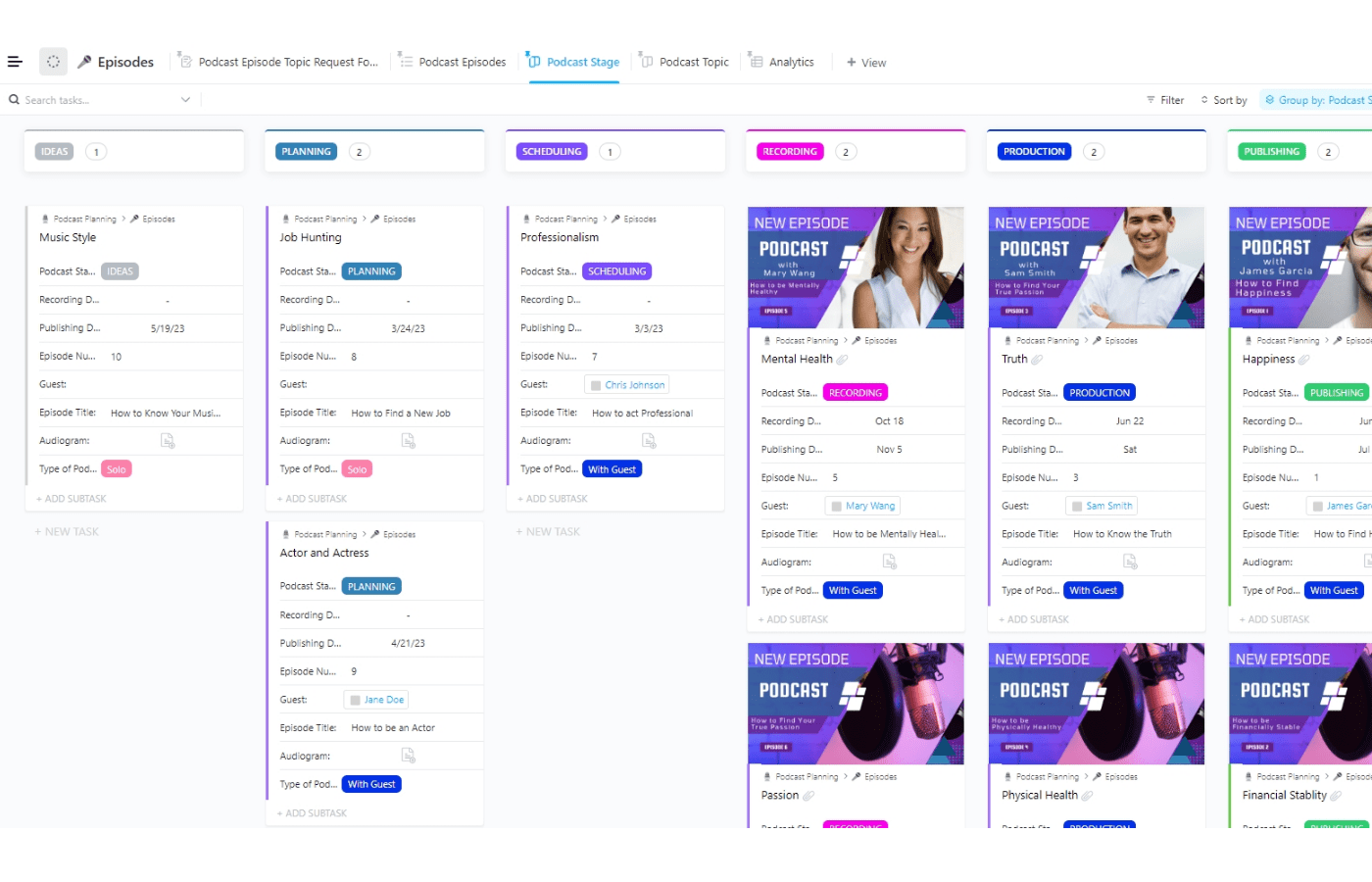Key takeaways
The challenge in hiring a top-notch project manager can be straightforward if the choice is clear, but it can be complicated when you’re sorting through hundreds of resumes that span from entry-level to highly credentialed and seasoned professionals. So if you want to know how to hire a project manager, you’ve come to the right place. In this article, we will outline steps and tips for getting the best project manager for your team and workload.
How to Hire a Project Manager
Recruiters and senior project managers have their work cut out for them when looking for a project manager. Following are the steps to take when hiring for this role as you seek to build an effective project team.
1. Identify and define role requirements
To set the stage for success, meticulously outline the skills, experience, and qualities essential for the project manager role. This clarity ensures everyone—from the hiring team to stakeholders—shares a common understanding of what to expect.
2. Research, create, and post a clear-cut job description
Craft a comprehensive job description that mirrors the role’s responsibilities and expectations. This document should act as a beacon guiding qualified candidates toward your organization while gently steering away those who don’t quite fit the bill.
3. Craft a robust recruitment strategy
Determine the channels and methods for strategically sourcing candidates. Consider including job boards, social media, professional networks, or recruiting agencies. A diverse recruitment strategy increases the likelihood of reaching a wider pool of qualified candidates.
4. Start screening candidates
Review resumes and scan for relevant experience, noteworthy accomplishments, and skills that match the needs of the project and organization. Gather a list of top candidates to focus on.
5. Conduct phone screens
Phone screening is your gateway to knowing the candidates’ communication skills, professionalism, and initial fit for the role. This also helps narrow down the candidate pool before investing time in face-to-face interviews. You can ask a recruiter or utilize newer AI-assisted tools to accomplish this step.
6. Organize in-depth interviews with teammates
Have the candidates meet with key stakeholders and team members who will work closely with the project manager. Assess candidates’ problem-solving abilities, leadership skills, and their approach to managing projects and teams by providing recent examples. This may be a longer group interaction or a series of one-on-one interviews.
7. Assess cultural alignment
Assess how well candidates align with the organization’s culture and work environment. Are their core values similar? Are they adaptable? Are they collaborative? If there is something unique to your organization, like Friday happy hours or specific hybrid work rules, bring it up during the interview so there are no surprises for either party.
8. Evaluate each candidate
Gather feedback from interviewers and stakeholders. Seek consensus among team members. You may ask for a well-rounded assessment of each candidate’s suitability for the role so you can compare and decide better.
9. Verify references
Reach out to references provided by candidates to verify their work history, accomplishments, and character. This step provides insights into their past performance in a similar role and validates their qualifications.
10. Extend the job offer
Once the top candidate is identified, extend a formal job offer that details the role, compensation, benefits, and start date. Be prepared and expect to negotiate terms as needed to secure the candidate’s acceptance.
11. Start project manager onboarding
Create a comprehensive onboarding plan to help the new project manager acclimate to their role and team and immerse into the organization. Providing the necessary training, resources, and support sets them up for success starting with day one.
Tips for Hiring a Great Project Manager
Developing a project team requires paying close attention to every aspect of the hiring process. As recruiters and senior project managers, your choice of a project manager will greatly impact your team, work, and project successes. Let’s take a look at some tips for recruiting top talent.
- Pay attention to experience. Experience matters. Candidates who have navigated complex projects bring strategies, risk management insights, and a talent for juggling timelines. Relevant project experience means they won’t mistake a minor issue for a major crisis and will deal with these issues with confidence.
- Make your requirements clear. Certifications are like badges of honor. Clearly communicate your requirements upfront. A PMP (Project Management Professional) certification, for instance, signifies mastery of industry best practices. Certifications and education degrees take time and commitment to earn and maintain. They validate their toolkit so you know you have a qualified professional on your team. While you shouldn’t, by any means, limit your search only to candidates with certification, this is certainly a solid indication of their skills and training. However, the ratio of certified managers to available positions is very low and they command very high rates. Consider your budget as well as the candidate’s work history and work ethics.
- Look beyond technical skills. Technical skills are essential, but lack of mastery of any of them should not be a dealbreaker. While they must understand Gantt charts and be able to build out a project plan, it is equally important that they can orchestrate collaboration, negotiation, and stakeholder management. A variety of project management skills are necessary to be successful in the role. A PM who understands code and a laundry list of industry acronyms is valuable, but one who understands people is indispensable.
- Assess soft skills. Soft skills determine whether they’ll be a strong leader or fumble in delicate situations. Observe their communication, empathy, and conflict-resolution abilities. Will they be able to align diverse team members and keep morale high?
- Evaluate leadership style. Leadership styles affect and shape team dynamics. Can they lead with authority, collaboration, and liaison intelligently with stakeholders? Assess their ability to inspire, delegate, and adapt. A project manager’s leadership style impacts team motivation, decision-making, and overall project success.
- Conduct behavioral interviews. Behavioral interviews reveal patterns and learnings and predict future actions. Ask about their past challenges, how they handled conflicts, and their problem-solving approaches. Did they step up to the challenge and find a solution or sit on the sidelines hoping issues would resolve themselves?
- Seek collaborative team players. Seek candidates who thrive in collaborative environments. Can they blend their notes seamlessly with others? Work with others from different backgrounds, disciplines, and with varying opinions? Collaboration fuels creativity, innovation, and cross-functional problem-solving.
- Ask for specific work examples, successes, and failures. Specific examples on both ends of the spectrum reveal depth. Inquire about their successful projects, their role in overcoming obstacles, and even their missteps. These stories showcase their adaptability, resilience, and ability to learn from setbacks. Experiences of this kind are to be expected from time to time.
What to Look For When Hiring a Project Manager
Your pursuit of an exceptional project manager involves more than ticking boxes on a checklist. Let’s delve into the multifaceted qualities that define outstanding leadership in project management:
- Leadership abilities: Leadership is the light that guides the team through storms. Look for candidates who inspire, motivate, and navigate conflicts with finesse. A project manager’s ability to rally the troops directly impacts project success and timing.
- Communication skills and style: Clear communication is the bridge between ideas and execution. Candidates should articulate, listen actively, and adapt their style to that of the key stakeholders. Miscommunication can sink a project faster than a ship taking on water. Effective communication ensures alignment, minimizes misunderstandings, and fosters trust across the team, and this involves knowing the right questions to ask the project team and finding the best ways to approach and address concerns.
- Task management and delegation: Prioritizing tasks, allocating resources, and delegating responsibilities requires coordination and insight. Efficient task management keeps projects on track, prevents resource bottlenecks, and ensures timely delivery of deliverables.
- Industry-relevant experience: General project management skills are essential, but industry-specific insights are even better. Candidates with relevant experience better understand nuances and anticipate challenges. Industry context makes for improved decision-making, risk assessment, and stakeholder management minus the learning curve.
- Problem-solving abilities: Projects are obstacle courses. Candidates should be able to think critically and come up with creative solutions to complex issues. Problem-solving agility prevents bottlenecks, accelerates progress, and turns roadblocks into stepping stones.
- Organizational skills: Exceptional organizational skills keep timelines intact, deadlines met, and deliverables aligned. Meticulous attention to detail ensures nothing falls through the cracks. Chaos-free projects are possible when the leader knows how to take the reins and prioritize.
- Relevant experience vs. a list of credentials: Certifications are commendable, but practical experience is the true litmus test. Experience hones instincts, sharpens judgment, and reveals adaptability. A project manager who has been in and survived in the trenches is more valuable than one who looks good on paper.
Benefits of Hiring a Project Manager
Hiring a project manager offers a myriad of benefits that contribute to the success of projects and the overall efficiency of an organization. Here’s how:
- Projects are completed on time. Project managers improve project efficiency by streamlining workflows, setting clear goals and milestones, and implementing efficient project management methodologies. The results are projects and work being completed on schedule and within established budgets.
- Potential issues are spotted early. Project managers can actively identify risks, which allows the team to develop strategies to prevent them or mitigate their impact. This proactive approach minimizes the likelihood of project delays, cost overruns, and other setbacks.
- There is proper allocation of resources. Project managers can guarantee better resource management by ensuring that the right people with the appropriate skills are assigned to specific tasks. This optimizes resource utilization and maximizes productivity throughout the project lifecycle.
- Project managers bring knowledge to the table. They can draw upon their past experiences to anticipate challenges, implement best practices, and drive successful project outcomes.
- They offer an outside perspective. A project manager’s external viewpoint can uncover inefficiencies, identify opportunities for improvement, and challenge the status quo. Their fresh perspective can lead to innovative solutions that a team without a PM may often miss.
- There is smooth communication between parties. Project managers can facilitate clear communication and stakeholder management, a contribution that is invaluable and indispensable. As the primary point of contact for stakeholders, a project manager ensures that communication channels remain open and transparent. They facilitate communication across teams, manage stakeholder expectations, and promote alignment between project goals and organizational objectives.
- By entrusting project management responsibilities to a professional, organizations free up valuable time and resources for other core activities. Project managers with a dedicated focus on driving project success allow team members to concentrate on their respective roles and responsibilities and not fall into a pattern of acting like a project manager.
- Project managers encourage teamwork in an environment where team members have to work together towards common goals. They facilitate cross-functional collaboration and cultivate a positive team dynamic, resulting in creativity and innovation.
- Investing in a skilled project manager yields a high return on investment (ROI) by ensuring that projects are completed on time and within budget and yields an outcome that meets expectations. The benefits of hiring a project manager extend beyond individual projects and can positively impact the organization’s bottom line and long-term success.
Best Places to Find a Project Manager
Finding the right project management candidates can be a daunting task, but there are many resources to make the process easier. As a project management consultant who looks frequently, here are some recommendations on which platforms to use to discover top-notch talent:
Utilize LinkedIn’s vast network to reach out to project managers across various experience levels. Evaluate candidates’ profiles to gauge their expertise, competencies, and endorsements. Additionally, make use of LinkedIn’s search functionalities to refine your candidate pool according to location, industry, and level of experience.
Indeed
Indeed stands as a prominent hub within the job search landscape, attracting a broad spectrum of candidates, including project managers. Maximize its advanced search filters to tailor candidate searches to your specific needs. Additionally, seize the opportunity to broadcast job listings, ensuring exposure to a diverse pool of applicants eagerly seeking new opportunities, with the added bonus of receiving instant notifications upon their application.
Braintrust
Braintrust emerges as an innovative platform dedicated to connecting businesses with top-tier freelance talent, encompassing adept project managers among its ranks. Tap into Braintrust’s selectively curated network of highly skilled professionals, primed for project-based engagements, offering tailored hiring solutions adaptable to project scopes and budget constraints.
Toptal
Toptal garners acclaim for its roster of elite freelance talent, spanning project managers and software developers of exceptional caliber. Gain entry to a pool of meticulously screened candidates, boasting demonstrable expertise and a history of delivering standout results. Engage with Toptal’s specialized talent acquisition team to pinpoint the ideal project manager perfectly aligned with your unique project requirements.
FlexJobs
Specializing in remote and flexible job opportunities, FlexJobs presents an ideal platform for sourcing project managers seeking adaptable work arrangements. Peruse a handpicked selection of candidates actively seeking remote and flexible project management roles. Leverage FlexJobs’ robust screening mechanisms to identify skilled candidates dedicated to the remote work environment.
Upwork
Boasting a staggering 18 million freelancers, Upwork stands as a global powerhouse among freelancing platforms, offering an extensive reservoir of project manager candidates. Whether posting project listings or browsing freelancer profiles, access a wealth of talent possessing relevant skills and experience. Harness Upwork’s suite of communication and collaboration tools to engage with candidates, assess their suitability, and oversee project management with efficiency and precision.
These platforms, while all different, present distinct benefits when seeking project manager candidates. They grant access to vast networks, curated talent pools, and specialized services customized for specific hiring demands. By strategically utilizing these platforms, recruiters and senior managers can seamlessly identify and engage with high-caliber candidates that match their organization’s needs.
Apart from these, there are also recruiting software solutions hiring managers can use to streamline the hiring process and enhance the quality of talent acquisition. Some examples include Zoho Recruit, Greenhouse, and JazzHR.
Bottom Line
Hiring the best program manager requires a strategic approach and defined process that includes all of the stages of the recruitment process. From defining requirements and detailing an accurate job description to hosting interviews, assessing cultural fit, and narrowing down the candidates to a final offer, it is a meticulous process to find the perfect fit to guide your teams and projects to success. But at the end of it, you will have found a leader that meets or even exceeds your expectations, is invested in the position, and meshes quickly to your organization and business goals.





